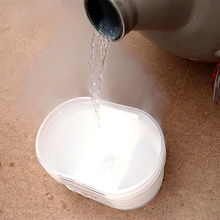
In physics, cryogenics is the study of the production and behaviour of materials at very low temperatures.
It is not well-defined at what point on the temperature scale refrigeration ends and cryogenics begins, but scientists
Discovery of superconducting materials with critical temperatures significantly above the boiling point of liquid nitrogen has provided new interest in reliable, low cost methods of producing high temperature cryogenic refrigeration. The term "high temperature cryogenic" describes temperatures ranging from above the boiling point of liquid nitrogen, -320 F (-195 C) up to -58 F (-50 C), the generally defined upper limit of study referred to as cryogenics.
A person who studies elements that have been subjected to extremely cold temperatures is called a cryogenicist.
Cryogenicists use the Kelvin or Rankine temperature scales present in nature.
The word cryogenics stems from Greek kÏÏο (cryo) – "cold" + genic – "having to do with production".